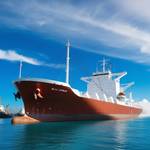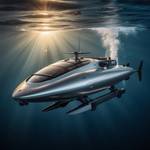Pod Propulsion
Pods are devices which combine both propulsive and steering functions in one device. They are usually located below the stern of a ship, making use of the following internal components: a fix pitch propeller, shaft, thrust and support bearings, brake, and shaft seals; exciter; AC motor (synchronous); bilge pump; and appropriate monitoring and control equipment. The steering unit uses slewing gears and is located in the hull above the pod itself. Lubrication equipment and ventilation/cooling units are usually located externally, as sub systems. Propulsion pods are not a new product, but a new configuration of traditional marine systems and components.
As yet, studies have not shown whether pods are more efficient than conventional shaft lines. There has been much research on the subject, but most studies have been aimed at a specific aspect of pod performance instead of an overall efficiency review. Several advantages have been attributed to pod propulsion systems, such as: reduced emissions, lower noise and vibration levels and emissions; improved steering maneuvering, and braking capabilities. The reduced number of component parts also allows for more flexibility in arranging system machinery, more efficient construction and improved shipyard logistics. On the opposite end of the argument, pods require a greater capital investment, have a 30MW power limitation (per screw), and have been known to suffer losses in power due to electric propulsion.

ZF Marine Debuts 4600 POD Propulsion System
Marine driveline specialist ZF announced it will premier its new 4600 POD Propulsion…

Superyacht ARTEFACT: A real “arte factum”
NOBISKRUG’s Project 790 is one of the first yachts built under the new strict IMO…

Shipbuilding: Inland Towing Thunderstruck
Eastern Shipbuilding offers the 4,200 hp Thunderbolt inland towboat designed around…

Thunderbolt: Eastern Delivers Innovative Towboat
Eastern Shipbuilding Group, Inc. introduced its new 120-ft., 4,200-hp Inland Towboat design…
Eastern Debuts ‘Thunderbolt’ Towboat
Eastern Shipbuilding Group, Inc. introduced its new 120-foot, 4,200-horsepower Inland…

Caterpillar Set to Showcase New Pod Propulsion Engine
Caterpillar Marine say they will unveil a significant product milestone at the 2013…

ZF Marine’s New Single POD Propulsion System
ZF Marine LLC, the North American division of the global ZF Marine Group, introduced…

Air Supported Monohull with Pod Propulsion
Effect Ships International AS, Sandefjord, Norway has just launched their first Air…
Royal Caribbean, Rolls-Royce Pod Settlement
Royal Caribbean Cruises Ltd. (NYSE, OSE: RCL) and Rolls-Royce announced that they…
STX Europe, New Order from French Navy
STX Europe has, through its subsidiary STX France Cruise SA, signed a contract to…
Siemens Equips Ships for Australia's Navy
Siemens Marine Solutions has been commissioned by the Spanish shipyard Navantia S.A.
Queen Mary 2 Commences Production With First Steel Cut
Pamela Conover, Cunard Line's president and COO, will make history today when she…

Bulk carriers are vessels that transport bulk cargo, such as coal, ore and cement. Bulk carriers play an important role in the global trade, facilitating the transportation of large quantities essential raw materials for different industries.
Naval architecture is the field of engineering which deals with the design, construction and repair of ships, boats, and other marine vehicles. Ship and vessel design relies on many of the same technologies and engineering expertise found on shore…

The maritime industry is on the brink of a revolution, with autonomous and unmanned marine vehicles poised to redefine the future of shipping. These innovative vessels, powered by advanced technologies and cutting-edge propulsion systems, offer numerous advantages, including increased efficiency, reduced operational costs, and enhanced safety. In this article, we'll explore the current state of autonomous marine vehicles, their propulsion systems, and the potential impact they may have on the global shipping industry.
Blockchain technology, initially developed as the backbone of cryptocurrencies like Bitcoin, is now making waves in the shipping industry. With its ability to provide secure, transparent, and tamper-proof records, blockchain is poised to revolutionize global supply chains, addressing some of the most persistent challenges in maritime logistics, including inefficiencies, fraud, and lack of transparency.

As the maritime industry undergoes a digital transformation, the integration of advanced technologies such as automation, Internet of Things (IoT), and big data is revolutionizing operations. However, this digital shift also brings significant risks, particularly in the realm of cybersecurity. Protecting maritime assets, systems, and data from cyber threats has become a critical priority as the industry becomes more connected and reliant on digital infrastructure.















